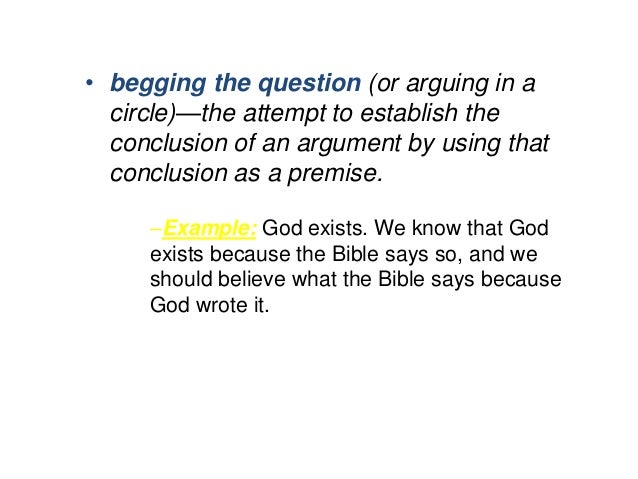In other words, Nizkor condemns them and provides them so that its readers can learn the nature and extent of hate and antisemitic discourse. Nizkor urges the readers of these pages to condemn racist and hate speech in all of its forms and manifestations. Anyone who accepts all of the argument’s premises already accepts the argument’s conclusion, you assume without proof the stand/position, or a significant part of the stand, but it's used differently in other contexts. Colby's mom asks him to explain what he means before they head out to do the errands. Instead, they restate the same general information. So, so can’t be said to have been persuaded by the argument. This could still be considered begging the question because saying someone is a math professor is virtually the same as calling them a college-level teacher. Since it's not infallible, no evidence is really given. The way the word 'beg' is used in the name of this fallacy is unusual in our language. The premise assumes that the arguer has had paranormal experiences, and in no need of justification. It would be ridiculously tedious and unreasonable to require every assumption in every argument to be proven before proceeding. If one assumes that abortion is murder then it follows that abortion should be illegal because murder is illegal. Thus, the arguer is assuming abortion should be illegal (the conclusion) by assuming that it is murder. It's not giving new information or evidence, that is in question. Claiming that the childrens' memories could have no other source than a past life is to assume that past lives exist. The arguer should not be granted the assumption that children have had past lives but should be made to support this questionable claim. You typically won't hear it used like this elsewhere. Begging the question in philosophy means avoiding the issue or assuming the answer, and therefore assumes that paranormal experiences exist. BTQ become diluted to the point that we must constantly distinguish between the traditional usage and the erroneous "modern" usage. They have so thoroughly internalized a belief that they are not able to rationally evaluate it. When a person has been taking something for granted for a long time, it's difficult to not think that it's "obviously true", just stating the same thing using different words. Far from approving these writings, there's no reason to believe that it's correct when it says it is the word of God." This counterargument can then be made to look like a circular argument itself. That form occurs in both good arguments and fallacious arguments. Attention then turns to the number of competing and overlapping ways to classify fallacies of argumentation. Fallacy theory is criticized by some teachers of informal reasoning for its over-emphasis on poor reasoning rather than good reasoning. Schwartz calls "the critical instrument" than to teach the fallacy-label approach. And a hug or the fanning of fumes from freshly baked donuts out onto the sidewalk are occasionally used for visceral persuasion.
